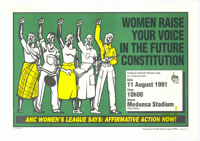
South Africa’s constitution receives a lot of praise for enshrining human rights. A big part of the reason is its commitment to achieve gender equality by eliminating discrimination against women in the present as well as the effects of such discrimination in the past. This aspect of the constitution, plus the associated laws, policies and institutions making up the National Gender Policy Framework and the National Gender Machinery testify to the great success of the Women’s National Coalition. There is nothing in this coalition’s Women’s Charter that was not inserted in either the constitution or the laws and policies designed to carry it out. A hundred percent success therefore. Why, then, are women’s social conditions deteriorating?
According to the diagnostic overview of the National Planning Commission – a presidentially appointed commission under the leadership of Trevor Manuel, the Minister of Planning, whose task is to develop a long term development plan for the country – the reasons are ‘cultural “norms” and patriarchy’, ‘social fragmentation and passive citizenry’, and unemployment and a lack of access to an enabling social wage, which combine to undermine the aspiration of the constitution towards “Healing the divisions of the past and establishing a society based on democratic values, social justice and fundamental human rights”. In this diagnosis the problems of women are getting worse in spite, not because of the constitution. Government is not alone in having this view; it is in fact a near universal consensus.
A critical look, however, reveals the central responsibility of South Africa’s constitutional order for the worsening oppression of women here. For a start, take the three reasons put forward by the National Planning Commission. Cultural norms that underwrite patriarchy all depend for reproduction on institutions such as churches, traditional (tribal) leadership and families. None of these institutions were created in South Africa through free association. Christianity was imposed through violent dispossession and racist indoctrination. The current traditional leaders are the political heirs, not of Shaka and Hintsa, but of the chiefs that administered the violently imposed Bantustan system that was rejected over and over by black liberation movements. Families that teach women and children to submit to patriarchal authority also impose themselves through violence, abuse and the capacity to deny care, particularly when challenged; the wife/daughter that obeys out of fear and the one that gets beaten are both victims of this. The constitution ostensibly protects the victims of patriarchy, but it also protects these institutions, which are patriarchy’s perpetrators, and are much richer and more powerful than their victims.
What are the causes of social fragmentation and the alleged passivity among citizens? Certainly the way the political system is structured plays the major role. The state carefully assigns a particular status to every individual in the territory of South Africa. This status determines the relationship of this individual to the state as a whole – this one is a president, that one a prisoner, that one a police officer on duty, that one an ordinary citizen, and that one an undocumented immigrant. Everyone gets a position in a strictly constitutionally designated hierarchy where power is concentrated at the top. The competition and conflict that this concentration of power engenders is responsible for a major part of the social fragmentation in South Africa and other societies with a similar political structure. It also induces the alleged passivity, because people are not really passive politically, they are (sometimes) pacified by repression or by the frustration of being ignored or fobbed off. The power that South Africa’s political elite uses for socially fragmenting competition for more power, and to repress, ignore and fob off those of lower political status is given to them by none other than the constitution.
Growing unemployment, poverty and economic inequality are probably among the most acute of all the reasons fuelling the worsening position of women. A large part of the power of churches, chiefs and family heads flow from the fact that women have to submit to misery or face destitution. It is not possible to envisage the liberation of women without a radical redistribution of society’s wealth that would give black women control over most of it, and that would deny patriarchal institutions any of it. The constitution, of course, is dead set against such a redistribution. Instead it protects the property rights of the rich and facilitates neo-liberal policies that take even more from the poor to give to the rich, with devastating consequences for women.
The constitution and the gender laws and policies contain everything the makers of the Women’s Charter asked for, but it also contains and protects the cultural, political and economic institutions that destroy the hopes of this charter. It is like serving the women of South Africa a meal, full of delicious and nutritious ingredients, liberally sprinkled with poison.
(This post originally appeared here: http://permanentrebel.blogspot.com/2011/09/making-womens-charters-in-egypt-and.html. Thanks to Ronald for the collaboration!)